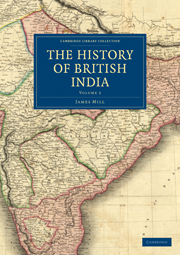Book contents
- Frontmatter
- Contents
- BOOK VI FROM THE ESTABLISHMENT OF THE NEW CONSTITUTION FOR THE GOVERNMENT OF INDIA, A° 1784, TO THE TERMINATION OF THE WAR WITH THE MAHRATTAS, A° 1805
- CHAPTER I
- CHAPTER II
- CHAPTER III
- CHAPTER IV
- CHAPTER V
- CHAPTER VI
- CHAPTER VII
- CHAPTER VIII
- CHAPTER IX
- CHAPTER X
- CHAPTER XI
- CHAPTER XII
- CHAPTER XIII
- INDEX
- Frontmatter
- Contents
- BOOK VI FROM THE ESTABLISHMENT OF THE NEW CONSTITUTION FOR THE GOVERNMENT OF INDIA, A° 1784, TO THE TERMINATION OF THE WAR WITH THE MAHRATTAS, A° 1805
- CHAPTER I
- CHAPTER II
- CHAPTER III
- CHAPTER IV
- CHAPTER V
- CHAPTER VI
- CHAPTER VII
- CHAPTER VIII
- CHAPTER IX
- CHAPTER X
- CHAPTER XI
- CHAPTER XII
- CHAPTER XIII
- INDEX
Summary
Lord cornwallis took in his hand the reins of the Indian government in the month of September, 1786. And was guided by a pretty extensive code of instructions, carried out from the joint manufacture of the Board of Control and the Court of Directors.
Of the two grand divisions into which the measures of this Governor-General are distinguished; those which regarded the interior management of the empire, and those which regarded its external relations; the one constitutes a subject distinct from the other; and we shall consult utility, by reserving the attempts which he made to improve the state of the government, till after the narrative is presented of the transactions which took place between him and the neighbouring powers.
The state of the connection with the Nabob of Oude was the object which first solicited the attention of Lord Cornwallis. The preceding Governor-General and Council had pledged themselves to Mr. Hastings for the support of that arrangement which was one of the last measures of his administration. But no sooner had Lord Cornwallis arrived in India, than the Nabob proposed to come even in person to Calcutta, and pressed in the most earnest manner for leave to send Hyder Beg Khan his minister. The object was, to represent as insupportable the weight of the burthen which was still imposed upon his country: and to entreat that the temporary brigade, now called the Futty Gur brigade, should, agreeably to the contract which Mr. Hastings had formed, but which had never been observed, now be withdrawn.
- Type
- Chapter
- Information
- The History of British India , pp. 171 - 208Publisher: Cambridge University PressPrint publication year: 2010First published in: 1817



